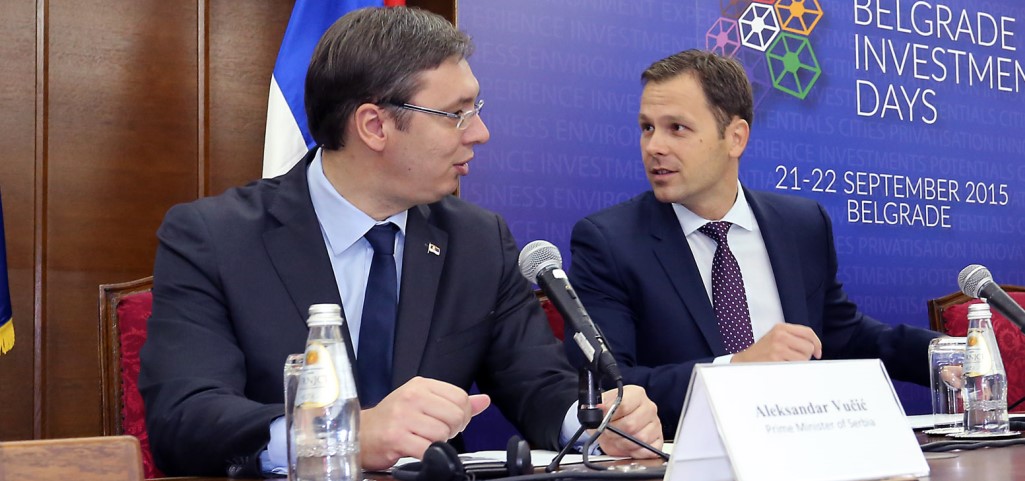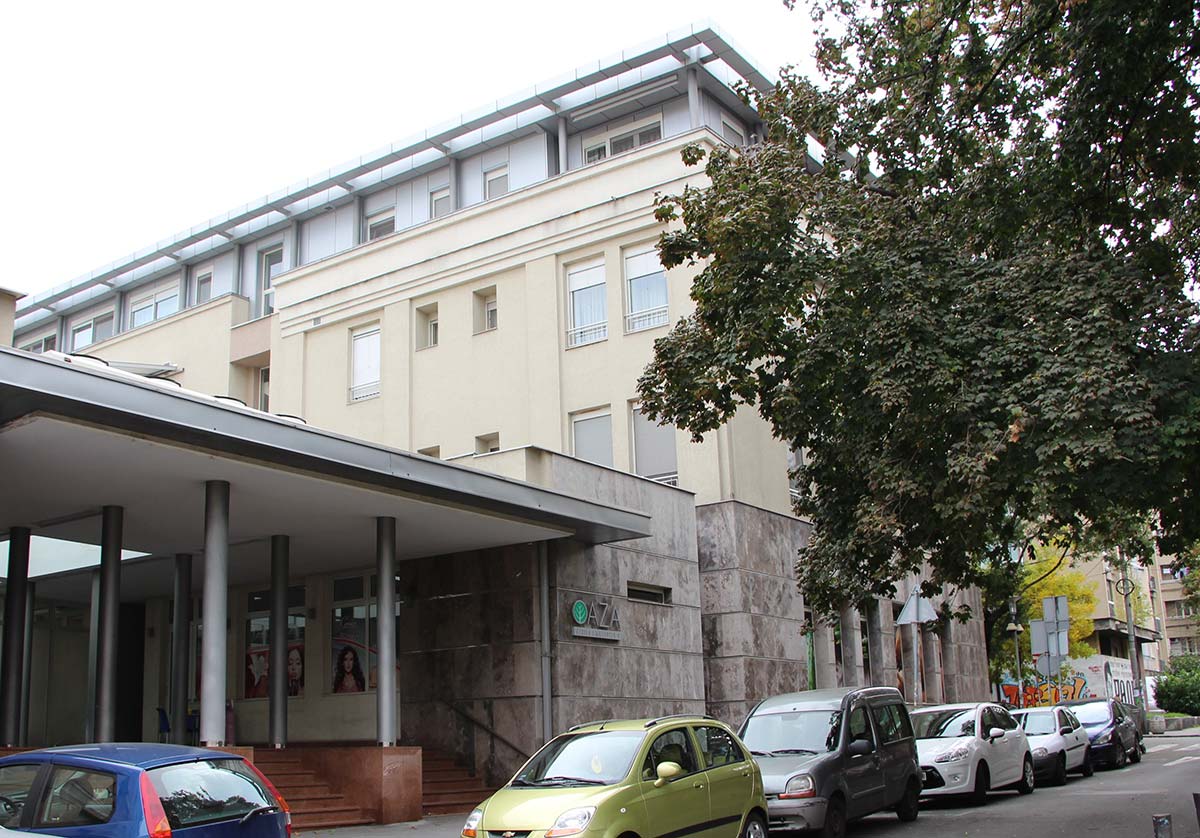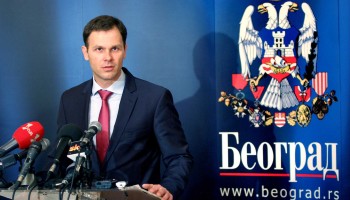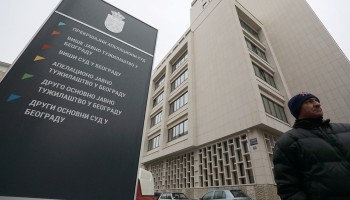The November 2016 report by the Serbian Administration for the Prevention of Money Laundering (APML) details suspicious transactions involving Mali, his wife, and companies he owned or worked for. The mayor held at least 42 accounts registered under himself, his wife, and his three underage children, into some of which he deposited large sums of money. He also had the power of attorney over three accounts registered under other names.
The origins of the damning report lie in an earlier scandal involving Mali. Serbia’s Anti-Corruption Agency opened an investigation into the mayor in 2015, immediately after KRIK/OCCRP discovered and reported on his involvement in the purchase of 24 apartments on Bulgaria’s Black Sea coast in 2012 and 2013.
The Agency outlined its suspicions about Mali’s money-laundering in a document which was then sent to the Higher Public Prosecutor's Office in Belgrade alongside APML’s report, which had been requested during the investigation.
According to the Agency, Mali was handling sums which far exceeded his official paycheck, which amounts to 107,000 dinars ($1,100 a month). In one case, the APML report shows, he received more than half a million euros in his private bank account from an offshore company under his control — thanks to a fake business deal that involved him, essentially, buying a company from himself.
But after receiving the reports containing evidence of Mali’s money laundering, prosecutors dismissed the case, saying that they saw no evidence of criminal activity and therefore no grounds to open an investigation. The decision wasn’t so surprising; in recent years, Serbia has not seen a single criminal case opened against a powerful politician.
(See OCCRP and KRIK’s article: Serbia's Corrupt Politicians Need not Fear the Prosecutor)
When contacted by reporters, the Higher Public Prosecutor's Office in Belgrade refused to provide KRIK/OCCRP with justification for the decision and declined to share the APML report. Nevertheless, journalists obtained a copy from another source which cannot be named because they were not authorized to provide it.
Independent auditor Ljubisa Stanojevic, who learned about the report’s content from reporters, described the many transactions detailed as a classic case of money laundering.
“There’s no question about it,” explained Stanojevic. “APML clearly indicated elements of money laundering. [On that basis], the prosecution could have done a serious investigation.”
You Can’t Get Rid of Him
Sinisa Mali became mayor of Belgrade in April 2014. After KRIK and OCCRP published a series of stories that exposed his engagement in corruption (including the Bulgarian apartments and an interview with his ex-wife, who divulged further information), it seemed for a moment that his political career was done for. Serbian president Aleksandar Vucic promised the public that he would fire the disgraced mayor by summer 2017 at the latest.
But Belgrade is still waiting. Vucic changed his mind, saying that he had made the promise in a moment of weakness, and that Sinisa Mali was the best mayor the city has ever had.
In fact, Mali may stick around for a while yet. The city holds elections for the members of the City Council on March 4, and whichever party wins a majority of 110 seats will be able to nominate its choice for mayor.
Political analysts anticipate that the country’s ruling Serbian Progressive Party (SNS), which has held a majority on the council since 2014, is likely to win the race. Sinisa Mali is in third place on the party’s list of potential city council members — but the SNS isn’t keen to advertise that fact.
 Serbian president Aleksandar Vucic with his close associate Sinisa Mali. Photo (c): KRIK.rs. All rights reserved
Serbian president Aleksandar Vucic with his close associate Sinisa Mali. Photo (c): KRIK.rs. All rights reserved
In fact, the ruling party’s campaign materials for the elections seem to feature every conceivable candidate but Mali. The first name on the party’s list is Zoran Radojicic, a doctor at the prestigious Tirsova pediatric clinic in central Belgrade. The second is the ballerina Aja Jung.
Normally, the candidate at the top of the winning party’s list becomes mayor. In theory, Sinisa Mali is only the third choice. But in practice, he could get lucky; both Radojicic and Jung have openly said in interviews to Serbian media that they are not enthusiastic about careers in politics. As Radojicic put it, he wouldn’t give up his job for any other.
The SNS’ promotion of such celebrated, but reluctant, public figures in the race has led observers to suspect that the party is setting Mali up for yet another term as mayor. There’s a logic to this approach — Mali’s involvement with controversial projects such as the Belgrade Waterfront and his alleged corruption scandals has led to his becoming deeply unpopular with many of the capital’s residents.
Political analyst Cvijetin Milivojevic says that the electoral system in Serbia — in which citizens vote for an electoral list, not for an individual candidate — enables the ruling SNS party to keep a ‘place to hide.’
“You don’t have to put the person who will actually run the city administration as the candidate — you hide them behind a group of aldermen” said Milivojevic in an interview for OCCRP partner KRIK. “Right now, Mali is not the favorite — he’s hidden behind non-party people.”
“If citizens voted directly [for the mayor], then that person for sure wouldn’t be Sinisa Mali,” continues Milivojevic. “But if the SNS has a majority in the [municipal] assembly, they can put Mali in as mayor and nobody needs to ask the citizens anymore.”
Prominent Connections
Belgrade’s citizens may soon have some questions themselves, since Mali’s last tenure as mayor seems to have been quite lucrative. Almost half of the 45 bank accounts described in the APML’s report were opened under his name, while others were opened under the name of his wife, other people or companies. In the latter cases, Mali had power of attorney to control the accounts under unclear circumstances.
The accounts over which Mali had power of attorney were associated with companies and people he had dealt with in the past.
One personal account was opened under the name of a Belgrade architect named Bosko Urosevic. Since Mali had power of attorney over the account, he would be able to freely make payments and withdrawals, though in this case the report does not include information about any transactions.
(The account was held at Telenor bank, indicating that it must have been opened after Mali became mayor, since the bank only opened in Serbia in September 2014, six months after he came to the position.)
The connection between Mali and Urosevic is unlikely to be accidental. Reporters found that the two men share the same business partner -- the international construction company GTC, which is currently building a 100-million-euro shopping mall in Belgrade.
KRIK reporters tried to contact Urosevic through his company, but his employees responded that the architect never gives interviews for media, and will not do so now.
Belgrade’s New Mall
The Ada Mall, is being built on land formerly owned by the Minel Dinamo electric power company, which Urosevic acquired from Serbia’s state privatization agency in 2004. At the time, Mali had recent resigned as the agency’s director and was working for it as a consultant. The land is now GTC’s, though it is unknown how the company came to own it.
As KRIK has previously reported, Mali has his own business ties with GTC. His offshore company, Alessio Investment, registered in the British Virgin Islands, once owned some five percent of a GTC subsidiary, Real Estate Developments. Mali has not infrequently been the guest of honor at ceremonies concerning various GTC projects in Belgrade — the mayor typically lays the foundation stone on the construction site and cuts the ribbon to open the completed building.
The APML report reveals Mali’s connection with another prominent Serbian businessman, Slobodan Vucicevic. According to the report, the mayor had power of attorney over the bank account of Minel elvo, a company Vucicevic owns.
Business records show that Mali was on the company’s board of directors when Vucicevic acquired it in November 2008, and stayed on for five more months. He also held the same role in a number of other Vucicevic companies. Mali was also on the board of TV B92 as representative of Vucicevic, who partly owned the influential Serbian broadcaster.
Reporters couldn’t reach Vucicevic for comment about his relationship with Mali.
Strange Sales
The APML report indicates that Mali also had control over the bank account of Termotehna, a small air conditioning company formerly owned by two businessmen, Milos Djacic and Ranko Ivanovic. In August 2008, Mali deposited 1.1 million dinars (about $23,000) into the account in cash, which the agency marked as a suspicious transaction, probably due to its unusually large size.
Both businessmen told OCCRP/KRIK that they didn’t know that Mali had power of attorney over their account, adding that the money he had paid their company was in exchange for a garage he bought from them in Belgrade’s luxury Oaza residential complex. They could not explain why this transaction would require such an unusual arrangement.
 The Oaza residential complex in Belgrade, where the city’s mayor Sinisa Mali bought three apartments with money from a suspicious business deal. Photo (c): KRIK.rs. All rights reserved.
The Oaza residential complex in Belgrade, where the city’s mayor Sinisa Mali bought three apartments with money from a suspicious business deal. Photo (c): KRIK.rs. All rights reserved.
“Our company was installing air conditioners [in Oaza], and as compensation we got that garage. Then we sold it. [It was] the cleanest possible transaction!” explained Ivanovic. When asked by reporters, the businessman did not produce a contract indicating how he came to own the garage.
Mali himself bought two apartments in this upscale residential area near Belgrade’s downtown, two of which were transferred to his wife after they divorced.
As she explained to KRIK reporters in an interview last year, he owns a third apartment in the same area, but he is not registered as its official owner.
“These people are keeping somebody else’s money safe,” says independent auditor Ljubisa Stanojevic, commenting on Mali’s power of attorney over the bank accounts. “Simply put, if [the authorities] are looking at the origin of some property, you transfer the money — 20 percent here, 30 percent there, 50 percent elsewhere. And of course, you transfer a certain amount of money to your good friend — now it’s his, not yours. This is a disguised form of money laundering because the friend will not say ‘this isn’t my money,’ and the way the money is disposed of goes unseen.”
Drop off the Dinars
The APML’s report abounds in other examples of suspicious transactions. On November 15, 2012, Sinisa Mali arrived at a branch of the Hypo Alpe Adria bank in Belgrade and paid €47,000 ($59,800) of unknown origin into his account — in cash. The deposit was made six months after the SNS party of Aleksandar Vucic won parliamentary elections in Serbia. Three months after this transaction, Mali was appointed as Vucic’s economic adviser, a role he held until becoming the city’s leader.
Further suspicious payments were made into the account of Sinisa Mali’s former wife Marija — both before and after he become mayor. APML revealed in its report that between mid-2006 and November 2013, Marija Mali paid a total of €125,000 ($165,000) into her personal bank account — also in cash.
Serbia’s Anti-Corruption Agency calculated that by mid-2015, her account held some €95,000 ($113,500) more than she could legally have earned.
In an interview she gave to KRIK reporters last February, Marija Mali maintained that the discrepancy came about because her husband Sinisa had given her €95,000 in cash without telling her where it had come from. Following his instructions, Marija then paid the money into her personal account and spent it, in her words, “on family needs.”
When Serbia’s Anti-Corruption Agency took note of the transaction, Marija Mali said, her ex-husband forced her to give a false statement to the Agency in which she declared that she had been left the cash after her father’s death. According to the Agency, there is no evidence of any such inheritance. Marija explained that her then-husband had convinced her to give the statement by invoking their children’s welfare.
“I went to Sinisa in his office and told him, ‘Don’t do this,’ but he explained to me how important [the transfers were] for the children. Yes, [I needed to do it] to protect the children. First of all, I am a mother," she said in the February interview.
After an angry confrontation in which Sinisa physically frightened Marija, the couple divorced.
According to the APML report, Mali and his wife also deposited a total of about €25,000 ($29,800) into bank accounts belonging to their three underage children.
In its report, APML pointed to several suspicious transactions totaling €40,500 ($55,000) between 2008 and 2013 made to the account of Oli Consulting, a firm Mali had established many years ago. The funds came from companies registered in locations often used for opening shell companies that do no real business — Hong Kong, Switzerland, Bulgaria and Luxembourg. The payments were described as payments for consulting activities, but report does not give the names of the companies and reporters could find no evidence of any actual work performed.
The biggest transaction, and the biggest question mark, came in 2009.
On September 9, Sinisa Mali received €525,000 ($757,000) from a Swiss bank account owned by Alessio Investment, a firm registered in the British Virgin Islands.
Officially the transaction was a payment for Ferdi Genetics, a company Mali had sold to Alessio. But KRIK/OCCRP reporters discovered that the director of Alessio Investment is, in fact, Sinisa Mali himself. Essentially, Mali had paid himself for the company.
As the APML report shows, an employee of the Serbian branch of Hypo Alpe Adria Bank, where the account was held, came to the same conclusion. A bank employee handling the deal became suspicious when he noted the company was almost worthless and didn’t justify such a high price.
“According to financial reports, Ferdi Genetics is classified as a small businesses with only one employee and almost no finances,” said the employee in a report he sent to the APML.
The provenance of the €525,000 has never been discovered. However, the Agency was able to establish how it was spent — Mali used some of the money from this transaction to repay a bank loan he took out when purchasing apartments in Belgrade’s luxury Oaza complex, along with four garages.
Mali also used the funds to buy an apartment at the seaside resort of St. Nikola in Bulgaria. The mayor’s €93,000 ($134,000) retreat has a view of the Black Sea and of 24 similarly luxurious apartments he acquired in another scandal, and another story.
“Each account contains a little [bit of money], and so what? It’s not that much. It’s someone else’s money now — ‘I was just giving a treat to my friend!’ But if you add all these sums together and they’re related to one person, then they take on immense dimensions. It is obviously a method of concealing money laundering — and a very efficient method, because it doesn’t lead back to one person, but to a lot more companies or individuals” concludes the auditor Stanojevic.
As Belgrade gears up to another election, it seems the APML and Serbia’s Anti-Corruption Agency are left with many unanswered questions — perhaps more numerous than even Sinisa Mali’s bank accounts.






